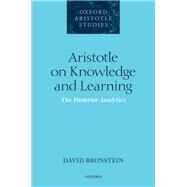Aristotle on Knowledge and Learning The Posterior Analytics
, by Bronstein, David- ISBN: 9780198724902 | 019872490X
- Cover: Hardcover
- Copyright: 5/24/2016
'All teaching and all intellectual learning come to be from pre-existing knowledge.' So begins Aristotle's Posterior Analytics, one of the most important, and difficult, works in the history of western philosophy. David Bronstein sheds new light on this challenging text by arguing that it is coherently structured around two themes of enduring philosophical interest: knowledge and learning.
The Posterior Analytics, on Bronstein's reading, is a sustained examination of scientific knowledge: what it is and how it is acquired. Aristotle first discusses two principal forms of scientific knowledge (epist?m? and nous). He then provides a compelling account, in reverse order, of the types of learning one needs to undertake in order to acquire them. The Posterior Analytics thus emerges as an elegantly organized work in which Aristotle describes the mind's ascent from sense-perception of particulars to scientific knowledge of first principles.
Bronstein also highlights Plato's influence on Aristotle's text. For each type of learning Aristotle discusses, Bronstein uncovers an instance of Meno's Paradox (a puzzle from Plato's Meno according to which inquiry and learning are impossible) and a solution to it. In addition, he argues, against current orthodoxy, that Aristotle is committed to the Socratic Picture of inquiry, according to which one should seek what a thing's essence is before seeking its demonstrable attributes and their causes.
Aristotle on Knowledge and Learning will be of interest to students and scholars of ancient philosophy, epistemology, or philosophy of science.
The Posterior Analytics, on Bronstein's reading, is a sustained examination of scientific knowledge: what it is and how it is acquired. Aristotle first discusses two principal forms of scientific knowledge (epist?m? and nous). He then provides a compelling account, in reverse order, of the types of learning one needs to undertake in order to acquire them. The Posterior Analytics thus emerges as an elegantly organized work in which Aristotle describes the mind's ascent from sense-perception of particulars to scientific knowledge of first principles.
Bronstein also highlights Plato's influence on Aristotle's text. For each type of learning Aristotle discusses, Bronstein uncovers an instance of Meno's Paradox (a puzzle from Plato's Meno according to which inquiry and learning are impossible) and a solution to it. In addition, he argues, against current orthodoxy, that Aristotle is committed to the Socratic Picture of inquiry, according to which one should seek what a thing's essence is before seeking its demonstrable attributes and their causes.
Aristotle on Knowledge and Learning will be of interest to students and scholars of ancient philosophy, epistemology, or philosophy of science.







